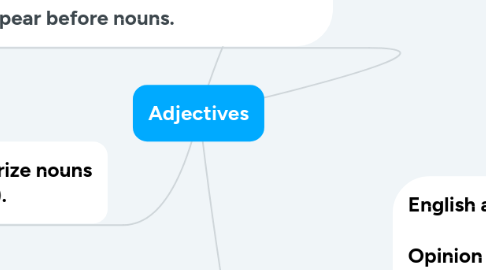Adjectives
by Caique Nascimento

1. Comparative
2. These are words that characterize nouns (beings, animals, objects, etc.).
3. Superlative
4. It is formed by the following expressions: as + adjective + as (as ... as) more + adjective + than (more ... than) less + adjective + than (less ... than)
5. It is formed by the following expressions: the most (expresses the superlative degree of superiority) the least (expresses the superlative degree of inferiority)
6. Possessive adjectives indicate possession of something, that is, indicate that someone has something. In English, these adjectives usually appear before nouns.
7. Examples: Adorable,lovely,friendiy,short,kind,tired,boring,determined, absent-minded,selfish,smart, brainy,happy,faithful,generous, delicious,handy,skillful,horrible insecure,irritating ,loyal,gorgeous mean,devilish,modest,organized, optimistic,patient...
8. Adjectives usually appear before the noun. However, when there are link verbs in the sentence for example, there are exceptions.
9. English adjectives are classified as indicated: Opinion adjectives: express an idea or opinion. Size adjectives: express size. Age adjectives: express age. Format adjectives: express form. Adjectives of color: express the color. Adjectives of origin: express the origin or the nationality. Adjectives of religion: express religion. Adjectives of material: express the type of material. Adjectives of purpose: express purpose
10. When phrases have indefinite pronouns, adjectives must be placed after them.


